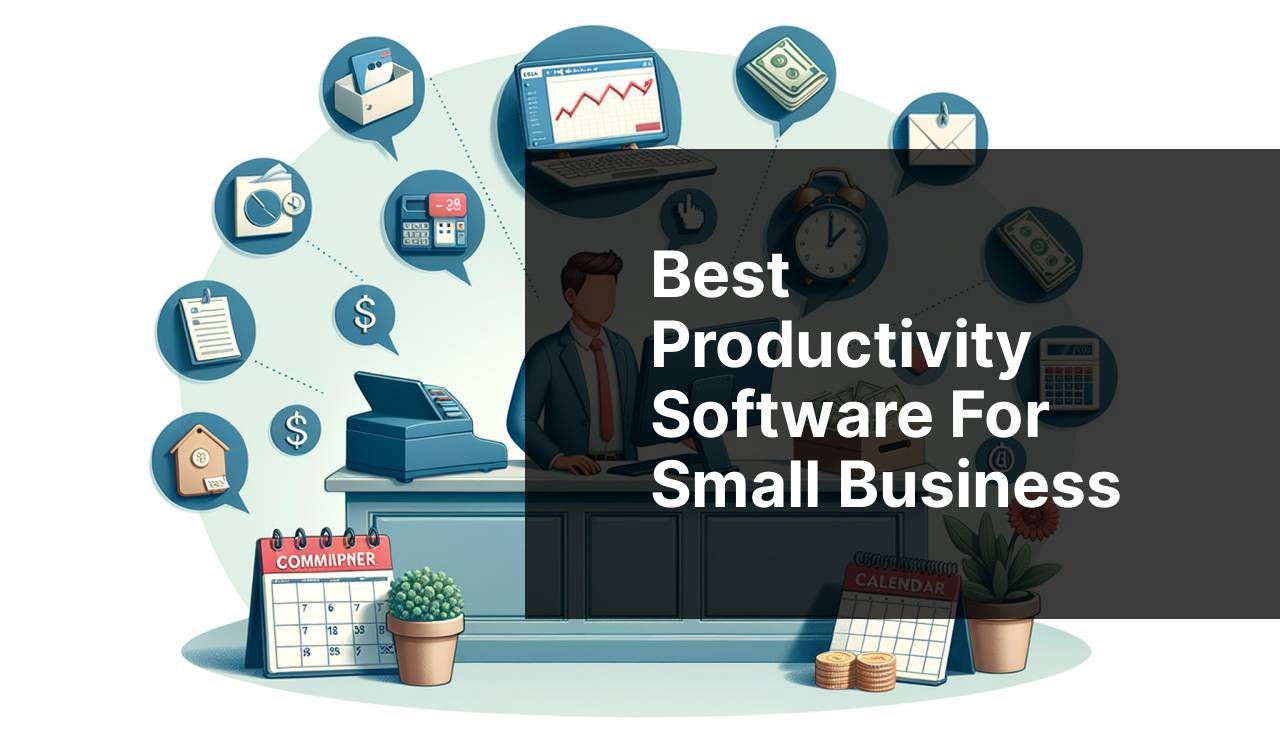Best Productivity Software for Small Business

As a small business owner, I’ve come to realize the incredible impact that the right tools and software can have on productivity. Throughout my journey, I’ve discovered and integrated various solutions that help streamline operations across different areas such as marketing, finance, and communication. In this personal recount, I’ll share top tools and software that have made a significant difference for my business, enabling us to run as efficiently as large corporations. For those looking to dive even deeper, here’s a curated list of 12 tools to enhance small business owners’ efficiency, which outlines additional options that align with smaller budgets yet yield substantial returns.
Common Scenarios:
Struggling with Marketing Strategies 📈
- As small businesses operate with limited resources, creating and managing effective marketing campaigns can be challenging. Without a dedicated team or the right software, it’s tough to reach the target audience.
- Social media management becomes overwhelming as businesses seek to establish a presence on multiple platforms.
- There is a significant amount of time spent on email marketing that can be automated for better productivity.
Juggling Finances 💼
- Financial management is crucial but can become complex for small business owners who may lack expertise in accounting.
- Tracking expenses and managing invoices can lead to inefficiencies if not handled properly with the right finance tools.
- Payroll management can also become cumbersome without an organized system in place.
Communication Breakdowns 📞
- Keeping a small team connected and in sync requires effective communication tools, especially with the rise of remote work.
- Project collaboration can suffer due to the lack of proper channels for team interaction and feedback sharing.
- Customer service can be hampered by inadequate customer relationship management systems.
Step-by-Step Guide. What Is The Most Important Tool For Small Business Owner:
Method 1: Marketing Automation 🤖
- Adopt a marketing automation platform such as HubSpot to streamline your marketing efforts.
- Use Canva for creating visually appealing marketing materials with ease.
- Implement Mailchimp for email marketing campaigns and subscriber management. Mailchimp
Note: Automation helps in scheduling content, segmenting customers, and analyzing results, freeing up time to focus on strategy.
Conclusion: Getting the right marketing software is critical to ensure your message reaches the right audience at the right time with minimal effort.
Method 2: Managing Finances Like a Pro 💹
- Implement QuickBooks for your accounting needs, including invoicing, expenses, and payroll.
- Connect Expensify for streamlined expense reporting and reimbursement.
- Utilize Stripe or PayPal to manage payments and online transactions. Stripe
Note: Consistent financial tracking ensures healthy cash flow and informative decision-making.
Conclusion: Even without an accounting background, these tools help keep your business’s financial health in check.
Method 3: Streamlined Communication Channels 🗨
- Utilize Slack for organized team communication and collaboration.
- Choose Zoom for reliable video conferencing and virtual meetings.
- Employ Asana for project management to keep all your team’s tasks in one place. Asana
Note: Clear communication tools help in keeping the team aligned and accountable.
Conclusion: Leveraging these platforms enhances productivity by simplifying collaboration across all levels of operations.
Method 4: Elevating Project Management 🛠
- Use Trello for visually organizing projects in a kanban style.
- Adopt Monday.com for a more advanced, customizable project management experience.
- Explore Jira if your team is managing complex software development projects. Jira
Note: The right project management tool can adapt to your business’s growth and changing needs.
Conclusion: These tools are crucial for keeping projects on track and aligning team efforts toward common goals.
Method 5: Optimizing Customer Relationship Management (CRM) 💖
- Choose Salesforce for a comprehensive CRM solution tailored to small businesses.
- Consider Zoho CRM for an affordable yet powerful system to manage leads and customer interactions.
- Integrate EngageBay for a multifunctional CRM that combines marketing, sales, and service automation. EngageBay
Note: A CRM system helps nurture customer relationships, resulting in higher customer retention and sales.
Conclusion: The proper CRM tool not only stores contact information but also provides insights into customer behavior and sales opportunities.
Method 6: Automating Inventory Management 📦
- Implement Shopify if you run an e-commerce store for seamless inventory tracking and sales.
- Use Square for small retail businesses, integrating sales to inventory management.
- Adopt QuickBooks Commerce for a comprehensive solution that syncs with other QuickBooks products. QuickBooks Commerce
Note: These tools help avoid overstocking or stockouts, critical for managing cash flow and customer satisfaction.
Conclusion: Inventory management software ensures you have the right amount of product, at the right time, in the right place.
Method 7: Enhancing E-signature Processes ✍
- Use DocuSign for secure and legal e-signatures on documents.
- Consider HelloSign for a user-friendly signing experience.
- Integrate Adobe Sign with other Adobe products for a seamless workflow. Adobe Sign
Note: E-signature tools speed up the contract signing process, reducing turnaround times for agreements.
Conclusion: Streamlining the document signing process is essential for closing deals faster and eliminating paper waste.
Method 8: Cybersecurity Measures 🔒
- Implement Bitdefender for comprehensive protection against malware and online threats.
- Choose LastPass for password management and to encourage secure password practices across the team.
- Adopt NordVPN to secure your internet connection, especially while working from public Wi-Fi. NordVPN
Note: Cybersecurity tools are essential to protect sensitive business and customer data.
Conclusion: Investing in cybersecurity software is a non-negotiable aspect of modern business operations.
Precautions and Tips:
Being Cautious with Integration 🔄
- Ensure that the tools you choose integrate well with each other to create a seamless workflow.
- Test out software through free trials before committing to a subscription to determine its fit with your business processes.
Keeping an Eye on Scalability 🌱
- Scalability should be a priority when selecting tools. They should grow with your business and adjust to increased demands.
- Look for software that offers different tiers of service, allowing you to upgrade as your business expands.
Investing Wisely 💰
- Always balance cost with functionality. Cheaper tools might not always offer the best value in the long run.
- Calculate the return on investment (ROI) when considering any new tool to ensure it contributes to productivity.
Maximizing Efficiency
Among the myriad ways to boost productivity within a small business, technology plays a pivotal role. It’s not simply about picking the most popular or most advanced solutions; it’s about identifying the ones that fit into your unique ecosystem. This approach has consistently worked for my business, and it can work for yours too.
One area that small businesses can particularly benefit from is cloud computing. It offers the flexibility and accessibility needed in today’s digitized world. Amazon Web Services (AWS) provides a comprehensive suite of cloud services that can be scaled to a business’s requirements. Amazon Web Services.
Another essential consideration is the integration of business intelligence (BI) tools. Platforms like Tableau and Microsoft Power BI enable you to visualize data and gain insights that inform strategic decisions. When leveraging such tools, you spark a data-driven culture within your organization, which is integral for long-term success.
Lastly, never underestimate the power of quality customer support and thorough training when adopting these tools. Companies like Zendesk excel in providing customer service software solutions, while online learning platforms such as Udemy and LinkedIn Learning offer opportunities for your team to upskill and adapt quickly to new software or practices. Udemy and LinkedIn Learning.
Conclusion:
Embracing the right tools and software is requisite for any small business aiming to scale and compete in the modern marketplace. Reflecting on my experience, I’ve witnessed first-hand how these technologies can empower a small team to operate with the proficiency and agility of a much larger corporation. Through careful consideration, any small business can select tools that not only boost current productivity but also pave the way for future growth and success. I encourage fellow entrepreneurs to leverage these insights and maximize the potential of your team and business ventures.
FAQ
How can a customer relationship management (CRM) system benefit a small business owner?
A CRM helps organize customer information, streamline sales processes, and enhance customer service, leading to improved customer satisfaction and loyalty.
What role does financial management software play for a small business?
It enables efficient tracking of income and expenses, simplifies tax preparation, and provides valuable insights into the business's financial health.
Why is it crucial for small business owners to use time management tools?
These tools help prioritize tasks, manage time effectively, and increase productivity, ensuring that key business activities get the attention they require.
In what ways can inventory management software aid small businesses?
It helps in maintaining optimal inventory levels, reducing overstock or shortages, and saving costs associated with unnecessary storage and stockouts.
How might email marketing platforms be valuable for small busines growth?
They assist in reaching out to a wide audience efficiently, engaging customers through newsletters or promotions, and tracking the success of email campaigns.
What are the advantages of using project management software for small businesses?
This type of software offers organized task management, facilitates team collaboration, and helps in meeting project deadlines with better resource allocation.
Can point-of-sale (POS) systems enhance operations for small businesses?
Point-of-sale systems streamline the checkout process, manage sales data, and provide valuable insights into consumer behavior and sales trends.
Why might a small business owner need an e-commerce platform?
Launching an e-commerce platform widens market reach, offers customers convenience, and can significantly increase sales beyond the constraints of physical location.
What is the significance of social media management tools for a small business?
These tools simplify managing multiple social media accounts, scheduling posts, analyzing performance, and engaging with the audience effectively.
How can cloud storage solutions be indispensable for small businesses?
They offer secure data storage, easy access from any location, improved collaboration, and help in protecting data from loss due to hardware failure. For further information regarding customer relationship management systems, you can visit Salesforce, and for insights on financial software, consider exploring Intuit.
